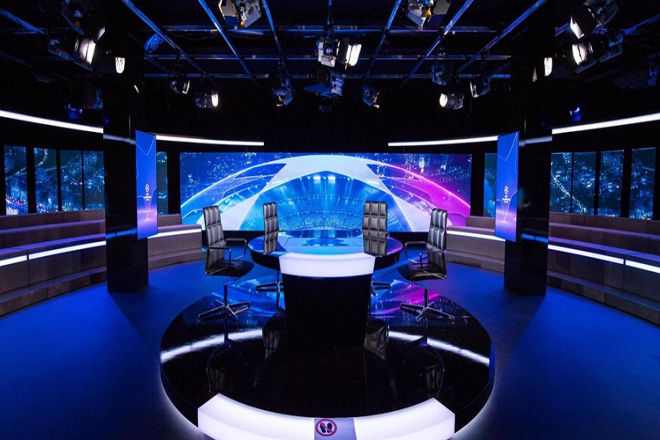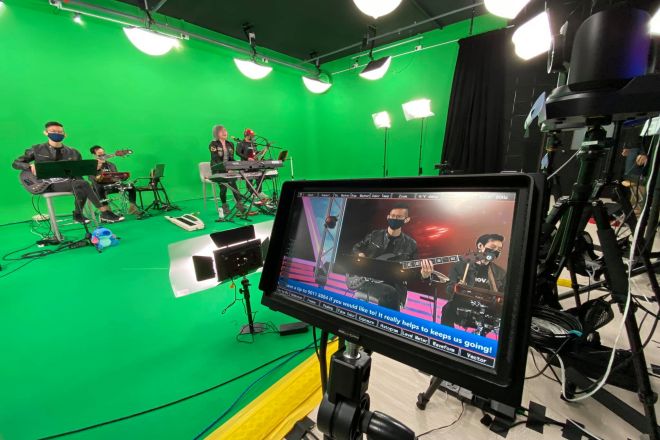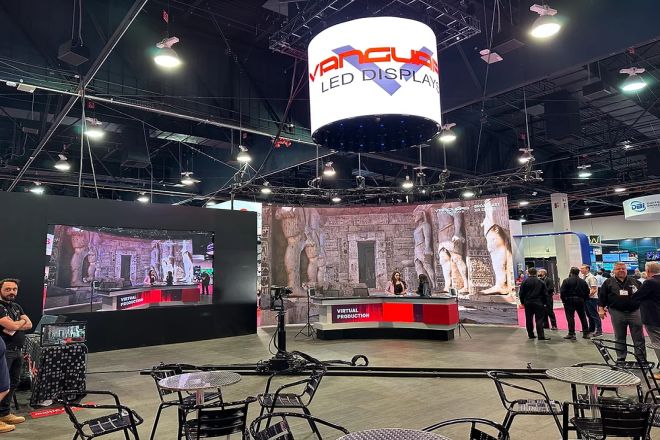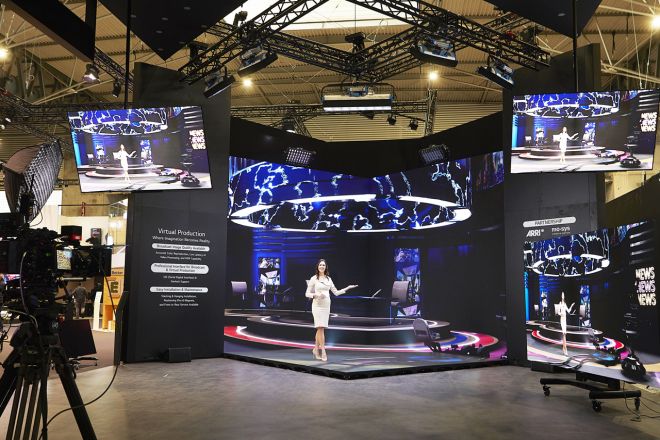Introducción

With the rapid development of science and technology, the studio, as the core place for TV program production, is constantly updating its technical equipment.
As an integral part of the studio, the evolution of display screens reflects the continuous advancement of television production technology. From the early green screen background to today’s pantalla LED de paso pequeño, every change has brought a more realistic and shocking visual experience to TV viewers.
1. The background and characteristics of the green screen era

In the early stages of television production, the green screen was widely used as a background technology. Its origins can be traced back to the early days of film special effects production.
When producers discovered that using green backgrounds could easily replace or add special effects in post-production, green screens gradually became an integral part of television program production.
The application principle of the green screen lies in the particularity of its color. Green is a color that is easy to identify and remove in post-production, allowing the special effects team to easily blend virtual elements with the green screen background to create rich scene changes.
The use of this technology enables TV programs to get rid of the constraints of physical venues and achieve more flexible scene switching.
Analysis of the advantages and disadvantages of green screen
1). Ventaja:
Low cost: Compared with building actual scenes, using green screens can save a lot of manpower, material resources, and time costs.
Short production cycle: The green screen background is relatively simple to set up and can be quickly set up and dismantled, thus shortening the program production cycle.
Easy to modify and replace: In post-production, the green screen background can be easily replaced or modified, making the program more flexible and diverse.
2). Defecto:
The visual effects are relatively simple: green screen backgrounds often lack realism and three-dimensionality, making the visual effects of the program relatively monotonous.
Lack of realism: Although green screen technology can realize virtual scenes, the audience can often feel this virtuality, resulting in a lack of realism in the program.
With the development of technology and the improvement of audience requirements for program quality, green screen technology is gradually being replaced by more advanced display technology. However, green screens still play a unique role in terms of specific program types and production needs.
2. The rise and development of LED display screens

The rise of LED display technology is undoubtedly a revolutionary advancement in the field of television production. This new type of display technology, with its unique characteristics of high brightness, high contrast, and high color saturation, has completely changed the visual presentation method of TV program production, bringing an unprecedented new experience to the audience.
Compared with traditional display technology, LED displays are more advanced in terms of light-emitting principles.
It uses LED light-emitting diodes as the light source and can present more vivid and realistic color effects by precisely controlling the brightness and color of each pixel. This makes the images in TV programs more vivid and three-dimensional, bringing a more shocking visual experience to the audience.
With the continuous advancement and breakthrough of technology, the resolution and display effect of LED display screens are also continuing to improve. The high-resolution LED display can present a more delicate and clear picture.
Whether it is detailed texture or color transition, it is all expressed vividly. This makes the visual effects of TV programs more realistic, making the audience feel like they are in a real scene.
As LED display technology continues to mature and improve, it has gradually replaced the traditional green screen background and become the mainstream background technology in studios.
Compared with the single and lack of three-dimensionality of green screen background, LED display screen can present richer and more diverse scenes and special effects. Whether it is beautiful natural scenery, bustling city scenes, or fantastic virtual worlds, LED displays can be easily realized, providing a broader creative space for program production.
In studios, the application of LED displays has also greatly improved the efficiency and flexibility of program production. Traditional physical background replacement requires a lot of time and manpower, while LED displays can quickly switch between different scenes through software control.
This not only greatly shortens the program production cycle but also enables the program production team to quickly adjust the background screen according to different program needs, bringing a fresher and more diverse visual experience to the audience.
In addition, the flexibility of LED displays is also reflected in their customizability. The production team can customize exclusive background images based on the theme and atmosphere of the program to make the program more distinctive and personalized.
This customized feature not only improves the quality of the program but also increases the audience’s sense of participation and immersion.
3. The rise and innovation of small-pitch LED displays
With its unique technical characteristics, small-pitch LED displays have emerged in TV studios in recent years and have quickly become a new favorite. This kind of display screen uses high-density pixel arrangement technology to greatly improve the resolution, making the picture performance unprecedentedly delicate and clear.
Every pixel has been carefully designed and manufactured to ensure that it can present more accurate colors and richer details, bringing an unprecedented visual feast to the audience.
The high resolution of small-pitch LED displays is not its only advantage. By optimizing the luminescent materials and driving circuits, this display also significantly improves brightness and contrast. This makes the display more dazzling when showing bright scenes while remaining deep and clear when showing dark details.
Whether it is showing brightly colored natural scenery or a city night scene with intertwined light and shadow, small-pitch LED displays can vividly display the picture with an amazing degree of restoration.
In the studio, the application effect of a small-pitch LED display is amazing. It can easily create a variety of realistic scenes and special effects, bringing the audience into a new virtual world.
Whether it is showing a vast grassland, a vast ocean, a fantasy wonderland, or a sci-fi future world, the small-pitch LED display can present the picture in front of the audience with amazing realism, making people feel like they are immersed in it.
In addition, the flexibility and customizability of small-pitch LED displays are also among the reasons why they are so popular in studios. Through the advanced software control system, the display screen can easily switch and transform various complex scenes to meet the needs of different types of programs.
Whether it is a news broadcast that requires quick scene switching or a variety show that needs to create a specific atmosphere, small-pitch LED displays can easily handle it. At the same time, the display screen can also be customized according to the program theme and atmosphere, presenting unique visual effects and adding more creativity and highlights to the program.
4. Future outlook

With the rapid development of science and technology, studio display screen technology is standing at a new starting point, ready to meet future challenges and opportunities.
We can foresee that in the future, studio displays will continue to move towards higher resolution, more realistic pictures, and more flexible applications, bringing revolutionary changes to television production and audience experience.
In terms of resolution, with the continuous advancement of pixel technology, future displays will be able to present more delicate and realistic pictures. Ultra-high-resolution displays will become mainstream, allowing viewers to enjoy a clearer and more detailed visual experience.
The development of this technology will not only improve the quality of TV programs but also bring a more immersive viewing experience to viewers.
In terms of picture authenticity, future displays will pay more attention to color restoration and light and shadow processing. Through advanced color management technology and light and shadow simulation technology, the display will be able to present a more realistic and natural picture effect. This will make the scenes and characters in the TV show more lifelike, making the audience feel like they are actually there.
In terms of application flexibility, future displays will be more customizable and interactive. Through the combination of intelligent control systems and multimedia technology, the display screen can be quickly switched and adjusted according to the program’s needs to achieve the presentation of a variety of scenes and special effects.
At the same time, viewers will also be able to interact with the display through interactive methods, making viewing more interesting and engaging.
In addition, as the concept of environmental protection becomes more and more popular, future displays will pay more attention to energy-saving and environmentally friendly design.
By using low-energy materials and optimizing circuit design, the display will be able to reduce energy consumption while ensuring performance, contributing to the sustainable development of the television industry.
Conclusión
From green screens to small-pitch LED displays, the evolution of studio displays has witnessed a leap in television production technology. Every technological innovation brings a more realistic and vivid visual experience to the audience.
In the future, with the continuous development of technology, we have reason to believe that studio displays will continue to bring more surprises and possibilities to TV production and audience experience.
Finalmente, si quieres saber más sobre las pantallas LED, Por favor póngase en contacto con nosotros.
